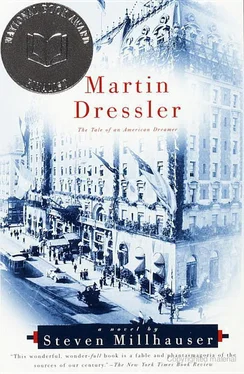He had his eye on the Boulevard, which below Seventy-second Street held stretches of four-story brick or frame buildings with shops at street level and modest apartments above. On one block he found a saloon, a grocery, a vacant store, a butcher shop, an undertaker’s, and a vacant lot. The vacant store interested him — he imagined it with a coat of skyblue paint and a dark blue awning fringed with white — but so did the vacant lot: speculators were clinging to their Boulevard properties as prices rose year by year. Rumors had sprung up again that the city was going underground, that trains would run below the Boulevard, with stations along the way. Martin imagined a city with trains in the air and trains under the ground, a fierce and magical city of moving iron, while along the trembling avenues there rose, in the clashing air, higher and higher, still buildings.
He was beginning to feel impatient with his long hours at the Vanderlyn. Not only was he reading and thinking through the daily correspondence, but he was drafting and typing up replies, which Mr. Westerhoven merely glanced at before unscrewing the cap of his shiny black fountain pen with the gold point, pressing it over the bottom of the pen with squeaky sounds, and signing his name in gleaming black ink, with many loops and swirls and a final flourish that reminded Martin of tying a shoelace. He would hold the typed letter at arm’s length, stare for a moment as if he were looking at a picture in a museum, and pass it suddenly to Martin with a rush of sound, half flutter and half crackle, for Martin to insert in an envelope and drop into a basket of envelopes, which a desk clerk would later carry over to the bellboys for stamping. Martin didn’t object to writing letters for Mr. Westerhoven, nor did he mind when Mr. Westerhoven, checking a draft, changed blunt phrases to more elaborate and circumspect locutions — no, what he kept coming up against was the knowledge that only small changes would ever be made in the operation of the hotel, and those only after the overcoming of an immense resistance on the part of Mr. Westerhoven, who liked to call himself a “preserver” and a “reconciler.” “You know, Martin,” he would say, pacing in his office with his coat open and his thumbs stuck in the pockets of his checkered vest, “what’s necessary in this business is to reconcile the best of the old with the best of the new.” By this he meant that although he had yielded in the matter of the new incandescent lights, he would be damned if he’d replace his fine old steam elevators with new-fangled electric ones, at tremendous cost — and to what end? To what end? He asked Martin: to what end?
In Mr. Westerhoven’s arguments there was always a ground of the solid and practical, but Martin knew that they were arguing less about elevators or telephones or expenditures than about something else: they were arguing about the manager’s secret desire to stop the city from its rush into the new century, his desire to return to his childhood parlor with its soft dark rug, its heavy curtains and vases of heavy-headed flowers, its mother with her bag of knitting in an easy chair by the window. Mr. Westerhoven had taken to sighing at the thought of the new department stores with their big plate-glass display windows full of fancy merchandise and had begun shopping in small out-of-the-way places, from which he would return with a hand-woven rug for his office, an old-fashioned snuffbox with hand-painted porcelain Cupids on the boxlid, a walking stick with an ivory head carved in the shape of a monkey. In his office hung a gilt-framed engraving that showed a bareheaded young woman with a flower in her hair, standing in a bower with a dreamy look on her sunny-and-shady face; at her feet lay a letter that she had just dropped.
Perhaps it was Mr. Westerhoven’s accumulation of knickknacks, perhaps it was the sense of stepping from the street into the old-fashioned lobby and from the lobby into the dark-paneled warm office with its thick-piled rug and glints of lamplit dark wood, in any case Martin sometimes had the sensation that he was stepping each day out of a world of excavations, scaffolding, and steam cranes lifted against the sky, into Mr. Westerhoven’s childhood parlor, with its heavy curtains looped back from the tall window, its odor of furniture polish and velvet, its dark softness of rug and sofa and tasseled pillow.
One rainy morning Martin was sitting at his desk in Mr. Westerhoven’s office, going over the housekeeper’s accounts and trying to decide whether the recent rash of torn bedsheets meant it was time to order a complete new set of bed linen, perhaps with the miniature image of the Vanderlyn in one corner, sewn in blue thread. Or was red thread better? The door opened and Mr. Westerhoven entered in his rubbers and ulster, holding a dripping umbrella. He plunged the umbrella into a stand that he had picked up in an antique shop near Washington Square, then hung his coat on a peg of the hat rack. He hooked his fedora over a second peg, pulled off his rubbers and hung each one on a separate peg, undid the buttons of his suit jacket, let out his breath once with a great whooshing sound, and, hooking his thumbs in the pockets of his vest, began walking up and down in the space between Martin’s desk and his own.
“A splendid day, my boy, wouldn’t you say? Well, but what I meant to say was: wretched, of course. A wretched day! Splendid in its own way, of course, but wretched nonetheless. Were it not for my umbrella — but why speak of that? I have something to say to you and I find myself a little … well of course, yes. And yet I have never been one to beat about the proverbial bush. Suffice to say that your services here — but of course you know all that. Great things are afoot, Martin. Our Mr. Henning — don’t breathe a word of this, my boy — our own Mr. Henning has been offered a managerial position at the Breresley — the Breresley, forsooth — and the good man has seen fit to inform me that it is his wish and desire to terminate his inestimable services and in short to leave us in the um proverbial lurch. To put it in a nutshell: as assistant manager of the Vanderlyn, you will report to me on a regular — but we can discuss the details later. Well? What do you say?”
Later that morning Martin paid a visit to George Henning in his office. Mr. Henning said that because of certain drawbacks in his present position he had started putting out feelers a year ago, hoping to find an assistant manager’s position at a good hotel; the offer from the Breresley had come as a complete surprise. The drawbacks, to be frank, concerned his prospects of advancement. In the normal course of things he would expect to become manager of the Vanderlyn, upon Mr. Westerhoven’s retirement in five or six years, but the special favor Mr. Westerhoven had shown Martin had made his own prospects less certain. In any case it was a splendid chance for Martin, whose line to the managership would now be secure; and during the next three weeks, before his move to the Breresley, he would be glad to be of help to Martin in the transition to assistant manager. Mr. Henning’s words were friendly, but something cool in his manner, something tight about the mouth, reminded Martin that the assistant manager saw in him only someone who stood in the way.
At lunch with Walter Dundee that afternoon, where he had planned to discuss his ideas for turning the billiard parlor on the second floor into a second-floor lunchroom, Martin opened his mouth to speak of Mr. Westerhoven’s offer, suddenly hesitated, and closed his mouth over a piece of rye bread and liverwurst. The hesitation puzzled him, but by the end of lunch, during which Dundee had advised waiting another six months before plunging recklessly into additional expense, Martin felt an odd exhilaration. That night in the parlor of the Bellingham he announced his decision to Margaret, Emmeline, and Caroline Vernon: he would leave the Vanderlyn.
Читать дальше












